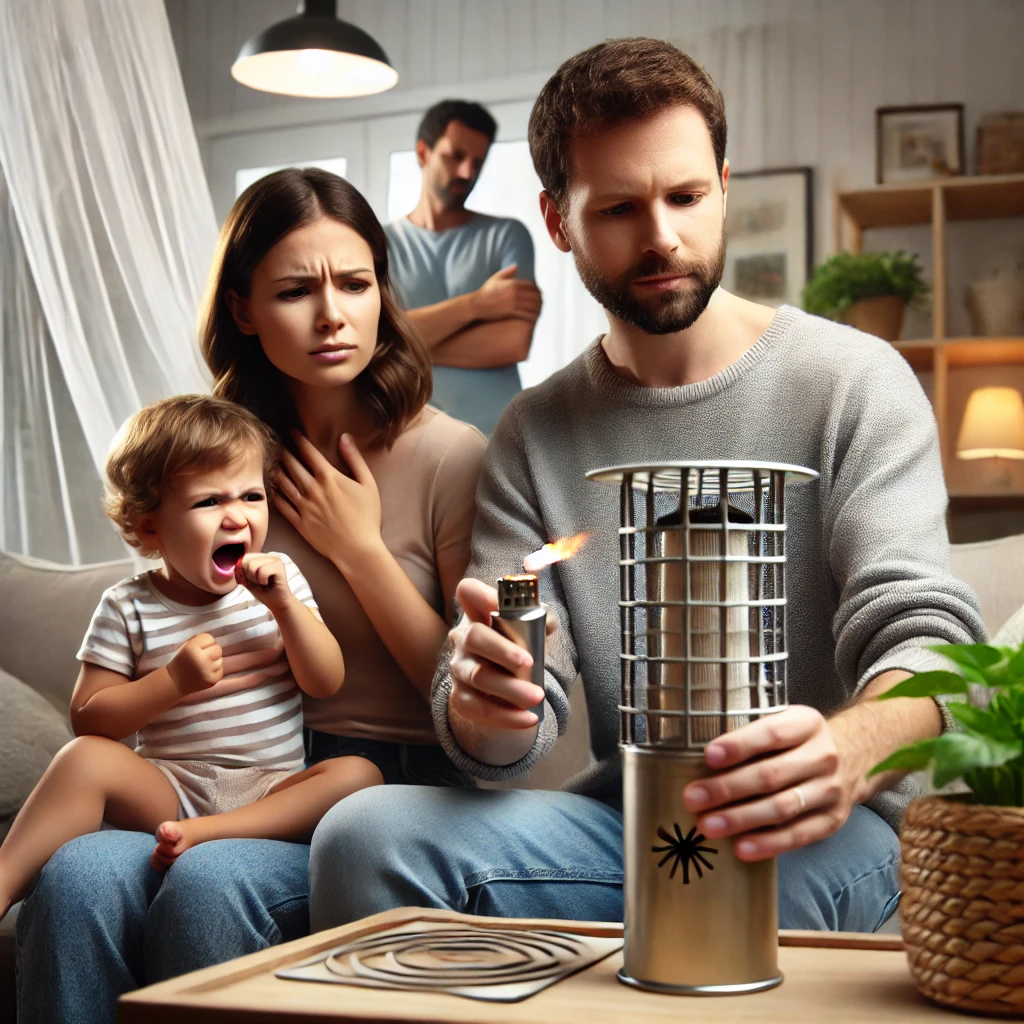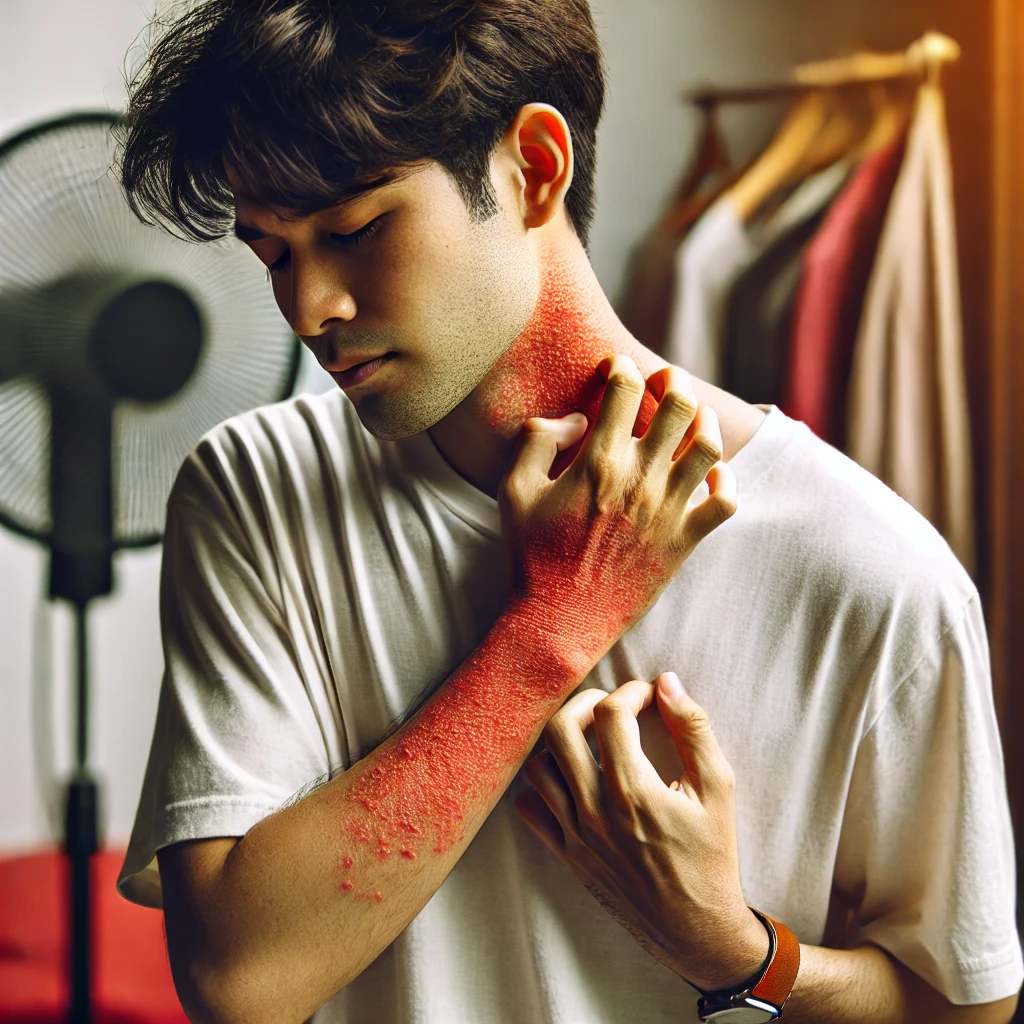1. Are Mosquito Coils Safe? Why They Smell Like Cigarettes
Picture this: It’s a humid summer night. You light a mosquito coil, hoping to enjoy a peaceful evening without itchy bites. But as that smoky haze fills the room, your throat starts to itch — a common sign of mosquito coil side effects that many families ignore. Your toddler coughs. Suddenly, you’re wondering: “Is this thing worse than the mosquitoes?”
The Ugly Truth:
Mosquito coils have been around since your grandma’s era, but here’s what nobody told you: Burning one coil releases as much toxic smoke as smoking 75 cigarettes (yes, you read that right!). That “harmless” smoke contains:
- Formaldehyde (the same stuff used to preserve dead bodies).
- Hydrocarbons (linked to lung damage over time).
Real-Life Consequences:
- My cousin’s asthmatic son ended up in the ER after sleeping in a room with a coil. The doctor said the smoke triggered a severe attack.
- A 2021 study found long-term coil users have a 40% higher risk of chronic bronchitis.
What to Do Instead:
- Go Electric: Use plug-in repellents with windows open.
- Net It Out: Mosquito nets aren’t just for jungles. They’re cheap, chemical-free, and 100% kid-safe.
- Citronella Candles… But Outside! Light them on your patio, not your bedroom.
Many people ask, ‘Are mosquito coils safe for humans?’ The truth is, long-term exposure can cause serious breathing problems.
2. Harmful Effects of Insect Spray on Health
You’re battling a dengue outbreak in your neighborhood. You grab that trusty mosquito spray, fog every corner of your home, and feel victorious—until the chemical stench gives you a pounding headache. Sound familiar?
The Spray Problem:
Most sprays use *pyrethroids—chemicals that attack mosquitoes’ nerves. But guess what? They mess with *your nerves too. Common side effects:
- Headaches that feel like a tiny drummer in your skull.
- Burning eyes (like chopping onions x10).
- Wheezing fits if you’ve got asthma.
A Horror Story:
My neighbor, Priya, sprayed her kitchen before a party. Two guests with asthma had to leave early, gasping for air. She felt awful.
If you’re wondering about the harmful effects of insect spray, remember that even indoor use can affect your nervous system.
Spray Smarter, Not Harder:
- Spray & Escape: Treat the room, then leave for 2 hours. Let the fan clear the air before letting kids back in.
- Wearable Repellents: Try clip-on devices (they’re like jewelry for bug-haters).
- DIY Natural Spray: Mix 10 drops lavender oil + 1 cup water. Shake, spritz, and breathe easy.
3. Mosquito Roll-On Repellent & Cream Side Effects
You slather on repellent cream before a hike, only to return with red, itchy patches. Turns out, fighting mosquitoes left you looking like you wrestled a cactus.
The Cream Conundrum:
Many mosquito roll on repellents also contain DEET, which, though effective, can cause allergic reactions on sensitive skin:
- Causing rashes on sensitive skin.
- Melting plastic (seriously—it can ruin your sunglasses).
- Triggering allergies in 1 out of 10 people.
A Cautionary Tale:
My friend Raj applied DEET cream before a camping trip. By day two, his arms were so swollen, he had to cut the trip short.
Skin-Saving Tips:
- Patch Test First: Dab a little cream on your elbow. Wait 24 hours. No rash? Go for it.
- DEET-Free Alternatives: Look for picaridin or lemon eucalyptus oil.
- Cover Up: Long sleeves + pants > slathering chemicals on skin.
4. Mosquito Protection Without Toxic Chemicals
Let’s be real: Mosquitoes aren’t just annoying—they’re deadly. In 2023, dengue cases spiked by 300% in some regions. So how do you balance “Don’t poison my family” with “Don’t let us get sick”?
The Hard Truth:
- Malaria kills a child every 2 minutes.
- Dengue can hospitalize you for weeks. To ensure mosquito protection without risking toxic exposure, combine natural repellents with safe indoor methods.
So Should You Risk Repellents?
Yes—but strategically. Think of repellents like antibiotics: Use the right dose, at the right time, and never overdo it.
Pro Tips for Safe Use:
- Zombie Hours Matter: Mosquitoes bite most at dawn/dusk. Apply repellent only during these times.
- Layer Your Defense:
- Nets at night.
- Fans during the day (mosquitoes hate wind).
- Natural repellents for low-risk hours.
- Know Your Enemy:
- Aedes mosquitoes (dengue carriers) breed in clean water. Empty those flower pots!
- Anopheles mosquitoes (malaria) love stagnant ponds.
5. Best Electronic Mosquito Repellents & Natural Alternatives
Fair enough. Here’s your cheat sheet:
For Kids & Sensitive Skin:
- Picaridin Roll-On: Gentle, odorless, and won’t melt Legos.
- Mosquito Patches: Stick ’em on strollers or backpacks.
For High-Risk Areas (Dengue Zones):
- DEET 10% Spray: Apply to clothes, NOT skin. Wash off after 4 hours.
- Permethrin-Treated Clothing: Bugs bounce right off.
For the “I Hate Chemicals” Crowd:
- Neem Oil: Smells earthy, works wonders.
- Bat Boxes: Invite mosquito-eating bats to your yard (yes, really!).
“But My Grandma Used Coils and Lived to 90!” – Debunked
Sure, some people smoke their whole lives and never get cancer. But why gamble? We know better now.
The Bottom Line:
Use chemicals wisely. Swap coils for nets. Trade sprays for roll-ons. And when in doubt, ask: “Would I let my kid eat this?” If the answer’s NO, don’t breathe it in either
If you still prefer chemical-based repellents, choose products tested for minimal side effects of mosquito coil or sprays.
Understanding mosquito coil side effects helps you make safer choices for your family and enjoy mosquito protection that truly works.
FAQ Section
Are mosquito coils safe for humans?
Mosquito coils release chemicals that may cause breathing issues or headaches if used indoors without ventilation.
Does mosquito coil cause breathing problems?
Yes, prolonged exposure can trigger coughing, asthma, or irritation in sensitive individuals.
Can DEET cause cancer?
There’s no strong evidence of DEET causing cancer in humans, but overuse may irritate the skin or eyes.







